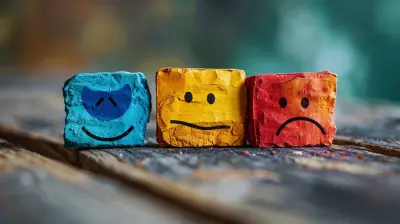How to Build a Growth Mindset and Achieve Your Goals
20 September 2025
Let’s face it—success doesn't come easy. Whether you're trying to hit a fitness milestone, climb the corporate ladder, or pick up a new skill, there's always one thing standing between you and your goals: your mindset. Specifically, we're talking about the growth mindset—a game-changer when it comes to personal development.
But what exactly is a growth mindset? Why is it such a big deal in the psychology and self-help world? And more importantly, how can YOU build one?
Let’s dive in and break it all down in a way that actually makes sense and sticks with you.
What Is a Growth Mindset?
A growth mindset is the belief that you can develop your abilities, intelligence, and talents through effort, learning, and persistence. The term was coined by psychologist Carol Dweck, and it's often contrasted with a fixed mindset—the belief that your qualities are carved in stone.Think of your brain like a muscle. If you train it, it gets stronger. That’s the growth mindset in action.
Now, don’t get it twisted—this doesn’t mean that anyone can become a genius overnight or that hard work alone fixes everything. But it does mean you’re not stuck where you are. And that’s powerful.
Growth Mindset vs Fixed Mindset: Know the Difference
To truly understand the magic of a growth mindset, we need to see what it looks like in contrast to its evil twin: the fixed mindset.| Growth Mindset | Fixed Mindset |
|---------------------|-------------------|
| Believes abilities can improve with effort | Believes abilities are static and unchangeable |
| Embraces challenges | Avoids challenges |
| Perseveres through obstacles | Gives up easily |
| Sees effort as the way to mastery | Sees effort as pointless |
| Learns from criticism | Ignores or takes criticism personally |
| Inspired by others’ success | Threatened by others’ success |
If you see yourself leaning toward the fixed side, don’t worry—you’re not alone. The good news is that mindsets can change.
Why a Growth Mindset Matters for Achieving Goals
Let’s be honest—achieving big goals is tough. The road is usually long, full of potholes, setbacks, and moments where you feel like giving up. That’s where the growth mindset becomes your secret weapon.Here’s why:
- You bounce back faster after failure
- You’re more motivated to keep going
- You’re more open to feedback and learning
- You develop grit and resilience—major keys to success
Think of a growth mindset as the fuel in your tank. Without it, you’re stuck on the roadside watching others zoom by.
How to Build a Growth Mindset (Step-by-Step)
Alright, let’s get practical. How do you actually develop a growth mindset? Here’s a no-fluff, step-by-step guide to help you do just that.1. Start Noticing Your Inner Dialogue
The way you talk to yourself matters—a LOT. That little voice in your head? It can build you up or tear you down faster than any critic out there.Pay attention to statements like:
- “I’m just not good at this.”
- “I’ll never be able to do that.”
- “I suck at [insert skill here].”
Sound familiar? Yeah, we’ve all been there. The trick is to catch that inner critic and reframe the message.
Try this instead:
- “This is tough, but I can get better with practice.”
- “I haven’t figured it out yet.”
- “Skills take time to develop.”
Simple shift, powerful effect.
2. Embrace the Power of “Yet”
This tiny word packs a serious punch. When you say “I can’t do this yet,” you leave the door open for growth. That one word transforms a dead end into a detour.Think of “yet” as your brain’s GPS, rerouting you instead of letting you quit. Use it often.
3. Seek Out Challenges (Yes, Really)
Challenges aren’t roadblocks—they’re training grounds. Every time you try something new or hard, you stretch your brain. Literally. Neuroscience shows that your brain forms new connections when you take on tough tasks.So stop playing it safe. If it scares you a little, it's probably the right move.
4. Reframe Failure as Feedback
Failure sucks. We all hate it. But guess what? It’s not the enemy—it’s the teacher.People with a growth mindset see failure for what it really is: data. Information. A chance to adjust and try again.
Remember: Thomas Edison failed 1,000 times before inventing the lightbulb. Would you keep going after that? With a growth mindset, you just might.
5. Focus on the Process, Not Just the Outcome
We get it—you’ve got your eyes on the prize. But obsessing over the end goal can actually trip you up.Instead, shift your focus to the process:
- Are you putting in consistent effort?
- Are you learning something new?
- Are you staying resilient through setbacks?
That’s where real success lives—in the grind.
6. Celebrate Small Wins
Here’s the truth: Motivation isn’t constant. Some days, you’ll feel like a beast. Other days, not so much.That’s why it’s crucial to recognize and celebrate the little victories. Each one fuels your fire and reinforces the belief that growth is happening.
Finished a tough workout? Celebrate it.
Made progress on a project? Acknowledge it.
Didn’t give up when you wanted to quit? That’s HUGE.
Small wins = Big momentum.
7. Surround Yourself With Growth-Minded People
You’ve probably heard the quote, “You’re the average of the five people you spend the most time with.”It’s true.
If the people around you whine, complain, and avoid growth, it's going to rub off. But if they’re pushing boundaries, learning new things, and picking themselves up after setbacks, their mindset will inspire yours.
Find your tribe. And if you can’t find one right away, follow inspiring thinkers, mentors, or join online communities that promote growth.
Real-Life Benefits of a Growth Mindset
Still not convinced? Let’s look at what a growth mindset can actually improve in your life.Career Advancement
Employers LOVE people who are teachable, adaptable, and willing to learn. Employees with a growth mindset grow faster, take initiative, and become problem-solvers.Better Relationships
Believe it or not, the growth mindset applies to relationships too. Instead of labeling your partner or friends as “just the way they are,” it allows room for change, communication, and personal development.Mental Health Boost
A growth mindset helps protect against anxiety, depression, and toxic perfectionism. Why? Because it encourages self-compassion and long-term thinking instead of shame or self-judgment.Lifelong Learning
The world’s changing at lightning speed. A growth mindset keeps you curious, capable, and ready to adapt—no matter how old you are.Warning: Don’t Fall for “Toxic Positivity”
A quick word of caution—you don’t have to be wildly optimistic all the time to have a growth mindset. It’s not about pretending everything’s fine or ignoring your struggles.Real growth mindset means:
- Acknowledging the struggle
- Giving yourself permission to fail
- Still believing you can figure it out
It’s not about being unrealistically upbeat; it’s about being relentlessly resourceful.
Common Pitfalls to Watch Out For
On your journey to developing a growth mindset, you might hit a few snags. Here's what to look out for:1. Expecting Fast Results
Growth takes time. You won’t suddenly become a master at something after reading a few motivational quotes. Be patient and trust the process.2. Comparing Yourself to Others
It’s easy to fall into the comparison trap, especially on social media. But everyone’s on their own timeline. Measure progress against your past self—not someone else’s highlight reel.3. Getting Discouraged by Setbacks
Setbacks are not signs to quit—they're signs you’re stretching. If you’re not failing occasionally, you’re not pushing hard enough.The Bottom Line
Here’s the deal: A growth mindset isn’t just a psychological theory—it’s a life philosophy. It changes the way you tackle problems, treat yourself, and chase your goals. It’s not always easy, but it’s always worth it.If you want to achieve meaningful goals—whether that’s running a marathon, launching a business, or becoming a better version of yourself—you’ve got to start with your mindset.
So the next time you catch yourself thinking, “I can’t do this,” pause. Catch that thought. And tell yourself, “I can’t do this… yet.” That one word could change everything.
all images in this post were generated using AI tools
Category:
Self HelpAuthor:

Matilda Whitley
Discussion
rate this article
1 comments
Mila McAllister
Excited to explore how a growth mindset can transform my goals!
September 20, 2025 at 3:00 PM

Matilda Whitley
I'm glad to hear that! Embracing a growth mindset can truly unlock your potential. Enjoy the journey!


